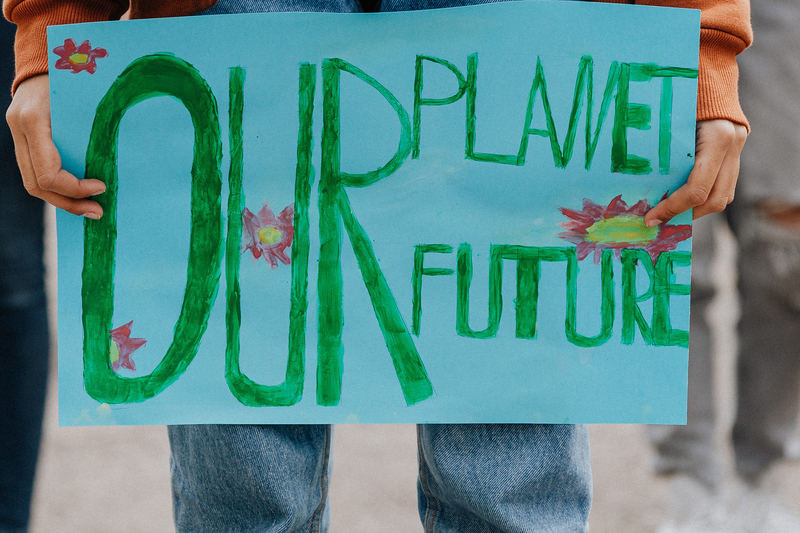Climate change: speaking youth to power
11 June 2021 | Story Ambre Nicolson. Photo Karolina Grabowska, Pexels. Read time 6 min.
UCT graduate students Koaile Monaheng and Tyler Booth recently joined UCT researcher Britta Rennkamp and other faculty and students from across the globe including United States, Italy, France, Germany, South Africa, Kenya, Ghana and Japan to discuss the role of intergenerational justice and existing iniquities in climate change. The event forms part of a series of roundtables held by global university alliance U7+.
Koaile Monaheng is a Mandela Rhodes Scholar from Lesotho who is currently completing his master’s degree in climate change and sustainable development at the African Climate and Development Initiative (ACDI). He describes U7+ as an international alliance of universities engaging in discussion and concrete action through the establishment of commitments that address the most pressing global challenges by universities in a multilateral forum.
“The U7+ Presidential Summit in particular presents the unique opportunity for the global student body to come together in one forum to engage, discuss, build frameworks, create spaces for debate and take action on global issues. In this context it is also of particular importance that UCT is the sole South African representative on the global stage in that forum.”
Monaheng, who is also a volunteer at Just Share SA, a non-profit shareholder activism organisation working to combat climate change, was invited to join the U7+ roundtable discussion along with fellow UCT graduate student Tyler Booth.
Booth recently graduated with a BMedSci (Hons) from the University of Cape Town and is currently awaiting the outcome of a Chevening Scholarship application to complete her master’s in climate change at the University of Leeds. In addition to her studies, she is a passionate climate and gender activist dedicated to bettering youth participation in policy processes. She was a lead drafter of the Joburg Youth Climate Action Plan (YCAP) and is the current focal point for the Climate Change Youth Policy Committee.
Together with Britta Rennkamp, a senior researcher at the ACDI, they co-hosted the event titled “Intergenerational justice in a post-pandemic world”.
This is not a future problem
In 2019 the Lancet Countdown Report, an international collaboration by researchers which monitors how health will be impacted by the climate crisis, predicted that a child born today will grow up in a world 4-degrees warmer than the pre-industrial one, in which climate change will impact everything from food security to disease and cycles of poverty. This was the central question posed by the U7+ roundtable: What do we owe future generations and how can we address the tradeoffs between economic prosperity in the present and near future and the well-being of future societies?
For Booth, the roundtable discussion held particular value since it was based on a collaborative co-learning model that encouraged young people to become better informed and to use their voices.
“Through conversations with scientists and researchers who are already informing policy to some extent, we ensure that young people are up skilled and better informed of climate change, and that their lived experiences and dreams of their future can translate into research. Better research will inevitably advise better policy.”
While Booth agreed with the focus being on the intergenerational aspects of climate change, she noted, “The burden should not be placed on children to protect the environment when their voices are not taken seriously, and they have had no hand in causing the climate crisis.
“I think instead of focusing our education on young people, we need to focus it on those with the money and power to make the changes that need to be made. For many people climate change is a thing of the future. The sooner everyone accepts that it is already here, and people are living with it, the sooner decisive action will be taken.”
The burden of risk will fall on Africa
Monaheng believes that platforms such as the roundtable are of particular importance because they provide the chance to highlight how the geographical iniquities of climate change will affect future generations.
“The irony is that despite contributing only marginally towards climate change, Africa is disproportionately affected by it. Furthermore, many of the projected climate risks are already happening on the continent. As the region that bears the greatest share of the global climate risk burden, we have a strong incentive to participate in global forums, to complement the scientific projections and observations with lived experiences.”
Rennkamp adds: “It is critical to understand the different injustices and inequalities to climate change and climate policies in terms of distributional, recognitional and procedural justice. This will require a lot of effort and an intergenerational contract.”
The roundtable presentation can be viewed here: https://www.youtube.com/watch?v=P9PMmRtC_xU. The next event, ‘Social Sciences tackle the Gender Gap’, will be held on 16 June 2021.
 This work is licensed under a Creative Commons Attribution-NoDerivatives 4.0 International License.
This work is licensed under a Creative Commons Attribution-NoDerivatives 4.0 International License.
Please view the republishing articles page for more information.
Research & innovation





































